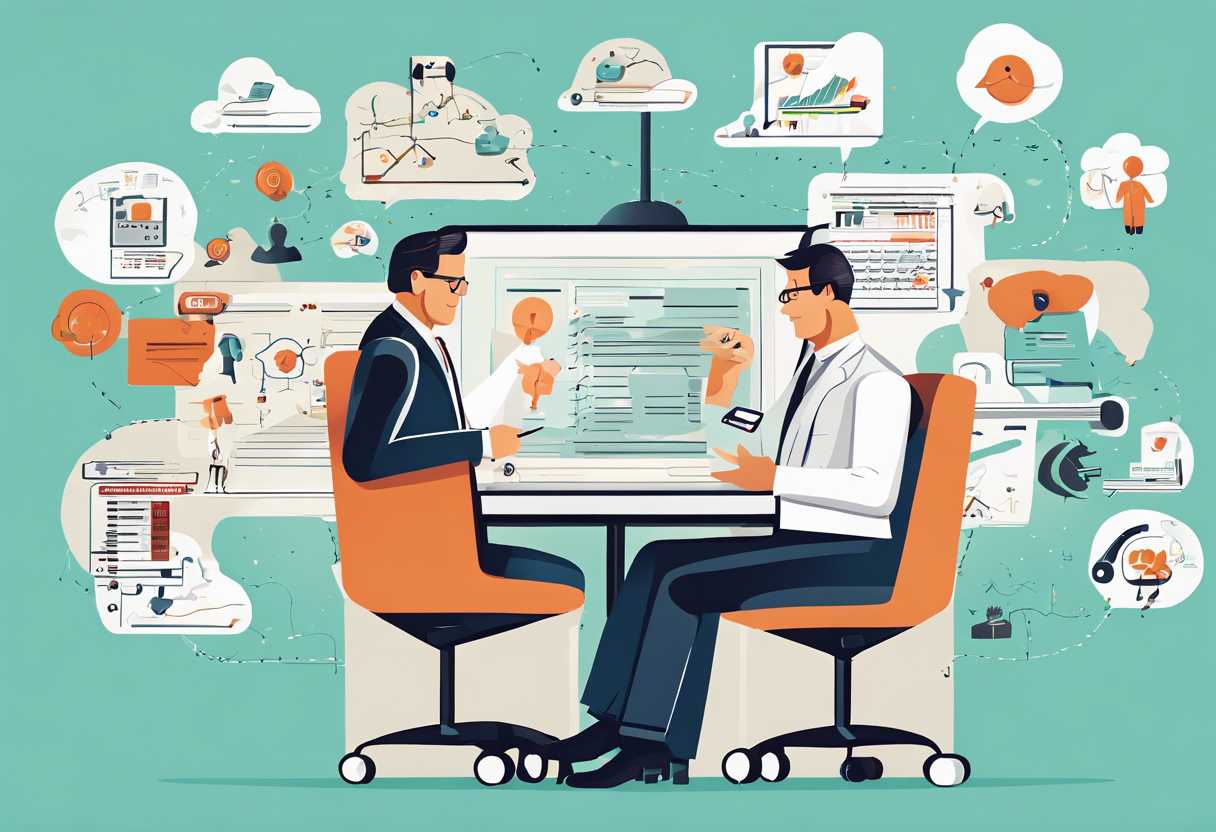Are CRM and customer service the same thing? This is a question that often arises in the business world. While both are essential components of a successful customer relationship management strategy, they serve different purposes and play distinct roles in the overall customer experience. In this blog post, we will delve into the nuances of CRM and customer service, exploring their differences and uncovering the impact of CRM on customer relationship management. We will also discuss how businesses can leverage CRM and customer service to achieve success and dispel common myths surrounding these two critical aspects of customer management. Join us as we unravel the complexities of CRM and customer service and gain a deeper understanding of their significance in today’s business landscape.
Understanding the Difference Between CRM and Customer Service
The Role of CRM in Customer Service
Customer Relationship Management (CRM) and customer service are often used interchangeably, but they serve different purposes within an organization. CRM is a strategy that focuses on managing and nurturing relationships with customers, while customer service is the support provided to customers before, during, and after a purchase. CRM systems are designed to track and analyze customer interactions, while customer service is more focused on addressing specific customer needs and issues.
Key Differences Between CRM and Customer Service
One of the main differences between CRM and customer service is their scope. CRM encompasses a broader range of activities, including sales, marketing, and customer support, while customer service is primarily concerned with addressing customer inquiries and resolving problems. Additionally, CRM is more proactive in nature, as it aims to anticipate and fulfill customer needs, whereas customer service is reactive, responding to customer requests and issues as they arise.
Benefits of Integrating CRM and Customer Service
Integrating CRM and customer service can lead to a more seamless and personalized customer experience. By leveraging CRM data, customer service teams can gain valuable insights into customer preferences and behaviors, allowing them to provide more tailored support. This integration also enables organizations to track customer interactions across various touchpoints, leading to more cohesive and effective customer engagement strategies.

Exploring the Role of CRM in Enhancing Customer Service
The Importance of CRM in Customer Service
Customer Relationship Management (CRM) plays a crucial role in enhancing customer service. By utilizing CRM software, businesses can effectively manage and analyze customer interactions and data throughout the customer lifecycle. This allows companies to improve customer satisfaction, streamline processes, and ultimately increase customer loyalty and retention.
Benefits of Implementing CRM for Customer Service
Implementing CRM for customer service offers a wide range of benefits. It enables businesses to gain a deeper understanding of their customers’ needs and preferences, leading to more personalized and targeted interactions. Additionally, CRM helps in tracking customer inquiries, resolving issues more efficiently, and providing a seamless customer experience across various touchpoints.
- Improved customer satisfaction and loyalty
- Enhanced customer engagement and retention
- Streamlined customer support processes
- Personalized and targeted customer interactions
Key Features of CRM for Customer Service
CRM software for customer service is equipped with a variety of features designed to optimize customer interactions and support. These features may include contact management, ticketing systems, knowledge bases, and integration with communication channels such as email, phone, and social media. By leveraging these features, businesses can effectively manage customer inquiries, track interactions, and provide timely and relevant support.
- Contact management for organizing customer information
- Ticketing systems for tracking and resolving customer inquiries
- Knowledge bases for providing self-service support options
- Integration with communication channels for seamless interactions
When considering the role of CRM in enhancing customer service, it’s clear that the benefits and features of CRM software are instrumental in creating a positive and efficient customer experience. By leveraging CRM effectively, businesses can build stronger relationships with their customers and drive long-term success.

The Impact of CRM on Customer Relationship Management
Enhanced Customer Engagement
Implementing a CRM system allows businesses to better understand their customers’ needs and preferences. By tracking customer interactions and purchase history, companies can personalize their marketing efforts and provide tailored solutions. This leads to increased customer engagement and loyalty, ultimately driving sales and revenue.
Improved Customer Service
CRM systems streamline customer service processes by centralizing customer data and communication channels. This enables businesses to respond to inquiries and resolve issues more efficiently, leading to higher customer satisfaction. Additionally, CRM software often includes ticketing systems and knowledge bases, further enhancing the customer service experience.
Enhanced Data Analysis
One of the key benefits of CRM is its ability to collect and analyze customer data. By leveraging this information, businesses can gain valuable insights into customer behavior, trends, and preferences. This data-driven approach allows companies to make informed decisions, optimize their marketing strategies, and identify new opportunities for growth.
Leveraging CRM and Customer Service for Business Success
Improving Customer Relationships with CRM
Customer Relationship Management (CRM) software is a powerful tool for businesses to manage and analyze customer interactions and data throughout the customer lifecycle. By leveraging CRM, businesses can gain valuable insights into customer behavior, preferences, and needs, allowing them to tailor their products and services to better meet customer expectations. *CRM also enables businesses to track and manage customer interactions, ensuring that no customer falls through the cracks and that all inquiries and issues are addressed in a timely manner.*
Enhancing Customer Service with CRM Integration
Integrating CRM with customer service processes can significantly improve the overall customer experience. *By centralizing customer data and interaction history, customer service representatives can provide more personalized and efficient support, leading to higher customer satisfaction and loyalty.* CRM integration also enables businesses to automate routine customer service tasks, freeing up agents to focus on more complex and high-value interactions.
Measuring Success with CRM Metrics
One of the key benefits of leveraging CRM for business success is the ability to measure and track key performance metrics. *By analyzing data such as customer acquisition costs, customer lifetime value, and customer satisfaction scores, businesses can gain valuable insights into the effectiveness of their CRM and customer service strategies.* This data can then be used to make informed decisions and improvements to drive business growth and success.
Unveiling the Myths and Realities of CRM and Customer Service
The Myth of One-Size-Fits-All CRM Solutions
One common misconception about CRM (Customer Relationship Management) is that there is a one-size-fits-all solution that can meet the needs of every business. In reality, every business has unique requirements and challenges, and a CRM solution should be tailored to address these specific needs. Whether it’s a small startup or a large enterprise, the right CRM system should be customizable and scalable to accommodate the growth and changes of the business.
The Reality of Personalized Customer Service
Another myth surrounding CRM and customer service is that automation and technology replace the need for personalized interactions with customers. However, the reality is that CRM systems are designed to enhance, not replace, personalized customer service. By leveraging customer data and insights, businesses can deliver more personalized and targeted interactions, ultimately improving customer satisfaction and loyalty.
The Myth of CRM Implementation as a One-Time Project
Many businesses mistakenly view CRM implementation as a one-time project, rather than an ongoing process. The reality is that successful CRM implementation requires continuous monitoring, evaluation, and adaptation to ensure that it continues to meet the evolving needs of the business and its customers. It’s not just about installing the software, but also about training employees, refining processes, and integrating feedback for continuous improvement.
Conclusion
After exploring the differences between CRM and customer service, it is evident that while they are closely related, they serve distinct purposes in the realm of business operations. CRM focuses on managing and analyzing customer interactions and data, while customer service is more about providing support and assistance to customers.
Throughout this blog, we have delved into the role of CRM in enhancing customer service and its impact on customer relationship management. It is clear that leveraging CRM and customer service is crucial for achieving business success, as it allows companies to better understand and cater to the needs of their customers.
As we unveil the myths and realities of CRM and customer service, it is important to recognize the potential of these tools in driving customer satisfaction and loyalty. By implementing effective CRM strategies and delivering exceptional customer service, businesses can build strong, long-lasting relationships with their customer base.
Ultimately, it is essential for businesses to integrate CRM and customer service seamlessly, recognizing the unique value that each brings to the table. By doing so, they can create a customer-centric approach that fosters growth and success.
As you continue to navigate the world of CRM and customer service, we encourage you to consider the insights shared in this blog and take proactive steps to optimize these aspects of your business. By doing so, you can position your company for sustained growth and prosperity.
Thank you for reading, and we hope that this blog has provided valuable insights into the relationship between CRM and customer service.

